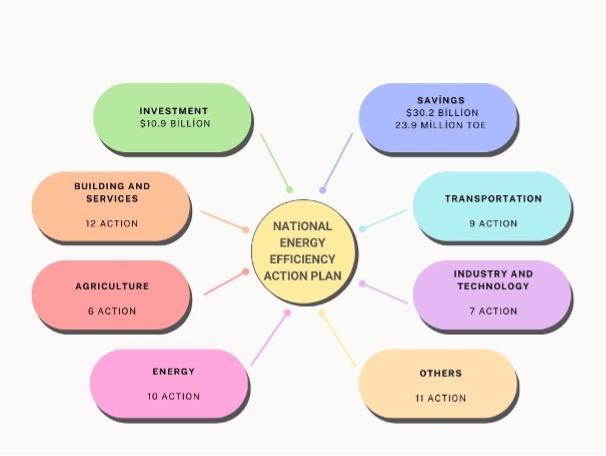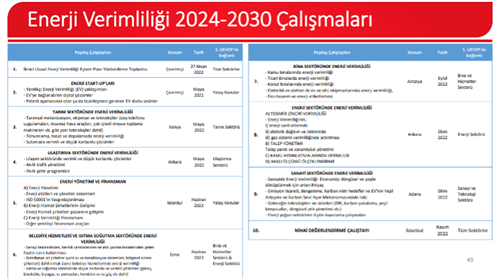OPENING MEETING OF THE NATIONAL ENERGY EFFICIENCY ACTION PLAN, DETERMINATION OF ENERGY EFFICIENCY 2030 VISION, STRATEGY AND 2ND ACTION PLAN PROJECT
Prof. Dr. Sermin Onaygil and Assis. Prof. Dr. Ebru Acuner from Istanbul Technical University Energy Institute attended the opening meeting of the Energy efficiency 2030 vision, strategy and 2nd Action Plan determination project held on April 27, 2022.
The meeting agenda included general information about the 1st national energy efficiency action plan, sectoral developments, achievements and challenges, information about developments supporting energy efficiency, climate change, the EU green deal, Turkey's net zero target, energy prices, projects and project approaches.
The National Energy Efficiency Action Plan (2017-2023), prepared under the coordination of Republic of Türkiye Ministry of Energy and Natural Resources, came into force by being published in the Official Gazette dated 02/01/2018 and numbered 30289, with the approval of the High Planning Council dated 29/12/2017.
Within the scope of the National Energy Efficiency Action Plan to be implemented between 2017 and 2023, it is aimed to reduce Turkey's primary energy consumption by 14% in 2023 with 55 actions defined in a total of 6 categories: buildings and services, energy, transportation, industry and technology, agriculture and horizontal issues. It is anticipated that a cumulative savings of 23.9 MTEP will be achieved by 2023 and 10.9 billion USD will be invested for this savings. The cumulative savings to be achieved until 2033 at 2017 prices is 30.2 billion USD, and the effect of some savings will continue until 2040.

Within the framework of the actions within the scope of UEVEP, 1,325 million US dollars were invested in energy efficiency in our country in 2021, and in return, 1 million 63 thousand TOE of primary energy savings with a monetary value of 372 million US dollars were achieved. With the work in 2021, a total of 15.61 million tons of CO2 emissions were reduced and 11,948 additional green jobs were created.
General information about the project is summarized in the table below.

The following developments came to the fore in the building and service sector in 2022:
• Thermal insulation campaign in residences was announced and insulation loans of up to 50 thousand liras per flat with a maturity of 60 months and an interest rate of 0.99 were started to be provided by Ziraat Bank, Vakıfbank, Halkbank and Ziraat Katılım Bank.
• With the Presidential Circular dated 15/08/2019 and numbered 2019/18, a minimum 15% energy saving target was defined for public buildings that are obliged to appoint an energy manager until the end of 2023. Work is being carried out to achieve the target, and a total of 31,855 TOE was saved in 2,432 public buildings in the 2019-2021 period. Considering current prices, the economic value of this savings is calculated as 543 million TL.
• In 2 municipalities (Manisa Metropolitan Municipality and Kütahya Municipality) selected for pilot application within the scope of the Turkey-Denmark Energy Efficient and Low Carbon Heating and Cooling Project; Studies have been carried out to prepare local heating/cooling plans to benefit from renewable energy sources such as geothermal energy, biomass, solar energy or the excess heat of industrial facilities, thermal power plants or garbage incineration facilities, and to prepare a guide that will set an example for other municipalities as a result of the experiences gained.
• In accordance with Article 14 of the EU Energy Efficiency Directive, the "Comprehensive Evaluation Report of Heating and Cooling Demand" has been prepared to reveal the district heating supply and demand potential. According to the report, it is predicted that the heating demand in residences, which is 131 TWh/year, will increase by 50% by 2040 and reach 198 TWh. It has been determined that there is the potential to connect low-carbon and efficient district heating systems to 5 million residences in a cost-effective manner by 2040 with domestic and renewable energy sources.
• The Green Certificate Regulation for Buildings and Settlements for the establishment of the National Green Building Information System has been published and the Turkish Environment Agency has been appointed as the evaluation agency.
• With the Regulation on Amendments to the Energy Performance Regulation in Buildings, the definition of Almost Zero Energy Building (nSEB) was added to the legislation. In this definition, buildings that will be nSEB must have at least Class B ETKB and have at least 10% renewable energy contribution. According to the regulation, as of January 1, 2023, newly constructed buildings over 5,000 m2 must be nSEB, while renewable energy UEVEP 2022 DEVELOPMENT REPORT 3 contribution rate can be applied at least 5% until January 1, 2025. As of January 1, 2025, all buildings over 2,000 m2 are required to be nSEB.
https://enerji.gov.tr/bilgi-merkezi-enerji-verimliligi-ulusal-enerji-verimliligi-eylem-plani
https://enerji.gov.tr//Media/Dizin/EVCED/tr/EnerjiVerimlili%C4%9Fi/UlusalEnerjiVerimlili%C4%9FiEylemPlan%C4%B1/Belgeler/UEVEP2022Gelisimi.pdf